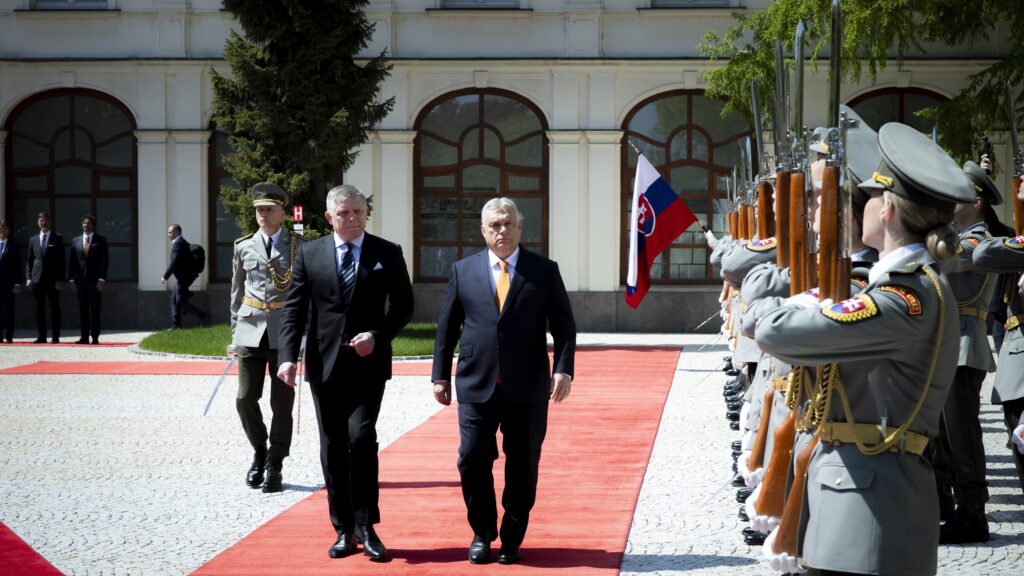On 28 April 2025, the Mathias Corvinus Collegium (MCC) hosted the first day of the Safeguarding Cultural Heritage in the 21st Century conference at Scruton MCC in Budapest. The event focused on the relationship between the law and cultural heritage.
Director General of MCC Zoltán Szalai opened the event by describing MCC’s approach to heritage through the restoration of historic buildings across Hungary and neighbouring countries. Head of the Centre for International Law at MCC Lénárd Sándor introduced the conference theme: that law is not just a protector of culture, but part of culture itself.
A panel discussion followed, featuring Rector of the Károli Gáspár University László Trócsányi; French lawyer and co-founder of the Cercle Droit & Liberté Thibault Mercier; Italian legal scholar Benedetta Vimercati; Director of Handong Institute of Law and Policy Eunseok Paik; and professor of constitutional law at Pázmány Péter Catholic University Balázs Schanda. The panel was moderated by Veronika Schüller. Each addressed different challenges to preserving national identity and constitutional traditions.
Law, Memory and the Temporal Dimension
The conference began with remarks from Zoltán Szalai, who emphasized that preserving cultural heritage is a practice MCC follows consistently. Rather than investing in new construction, MCC restores historical buildings across Hungary and neighbouring countries, creating educational centres that are physically rooted in tradition.
Lénárd Sándor opened the first session by arguing that law should not only protect cultural heritage but also be seen as part of it. Culture and law exist together in a living temporal flow.
Lénárd Sándor illustrated this point with a recent experience. Earlier this month, he taught at the Catholic University of Vendée, on the Atlantic coast of France. During his stay, he visited Les Sables d’Olonne, a port town today known for the Vendée Globe sailing competition. However, the town would go on to reveal much more to him: Roman ruins, medieval churches, 1930s architecture, lighthouses, fishing markets—all tied together by the tides. The heritage of the town is not merely its individual monuments, but a living, integrated memory.
Sándor compared this to Hungary’s Lake Balaton, often thought of only as a summer resort, but carrying deep historical meaning, linking past and present and pointing toward the future.
Without a living culture, he warned, ‘paintings are colourless, literature meaningless and the law remains just a pile of bureaucratic rules.’ He stressed that cultural traditions are needed for human maturity, just as society’s legal and moral structures require decades of cultivation.
Quoting János Pilinszky—‘First and foremost, we need to long for what is ours’—Lénárd Sándor warned that a society that forgets its cultural heritage will lose the ability to create, to aspire, and even to preserve the rule of law itself.
Constitutional Identity and the European Challenge
László Trócsányi opened his keynote by posing a fundamental question: ‘Can we overcome the struggles of our time, or is our cultural inheritance destined to be left in the past?’
He argued that law is not merely an intellectual system but ‘also a culture and an ethos.’ Drawing on René David’s classification of legal families, Trócsányi stressed that the legal systems of different civilizations (Romano-Germanic or Civil Law, Common Law, socialist legal system, Islamic and Far Eastern) reflect distinct cultural foundations. In the Romano-Germanic traditions, for instance, written legislation is the primary source of law.
Reflecting on his career, Trócsányi pointed to tensions within the European Union between national constitutional orders and the push toward supranationalism, citing the Maastricht Treaty and the eastward expansion of the EU. He noted that although EU law has expanded, sovereignty must not be dissolved. ‘When Hungary signed the Lisbon Treaty, it did not renounce its statehood nor its freedom to determine its politics’, he recalled, referencing his 2010 concurring opinion at the Hungarian Constitutional Court.
Trócsányi warned against cultural homogenization, observing that ‘Europe’s strength lies in its variety’. In France, liberty, equality, fraternity, secularism, and republicanism define constitutional identity; in Hungary, the foundation of the family holds a constitutional place. Switzerland champions direct democracy. Enforcing uniformity, he argued, would strip Europe of its true heritage.
He urged that European institutions must ‘show great restraint’, recognizing that national and European identities can coexist, but not if local sovereignties are erased. ‘In varietate concordia’, the European Union’s motto, must remain a real principle, not an empty slogan.
Trócsányi concluded by emphasizing that preserving cultural heritage through constitutional identity is not nostalgic but vital for Europe’s political future.
Law, Identity, and the Risks of Reinterpretation
As part of the panel discussion, Benedetta Vimercati reflected that postmodern notions of identity disregard what the drafters of the Universal Declaration of Human Rights understood: that individuals emerge from culture, and cannot be sustained without cultures. Citing Luigi Pirandello’s One, None and a Hundred Thousand (1926), she warned that the modern self, disconnected from collective identity, faces dissolution. As Peter Häberle wrote: ‘constitutions are not mere legal texts or normative rulebooks, but an expression of cultural development, the means to cultural self-presentation of a people, a mirror of their cultural heritage and foundation for renewed hope’.
Eunseok Paik presented a recent Korean Supreme Court decision concerning health insurance benefits. A man attempted to register his same-sex partner as a dependent through his employer’s insurance. Initially approved in error, the benefit was later retracted. Paik explained that same-sex marriage is not recognized constitutionally in Korea, on the basis of Article 46 of the Act on the Registration, etc of Family Relationships, which distinguishes between children born within and outside wedlock, assigning parental responsibilities accordingly.
However, considering whether denying benefits violated the principle of equality, a local court found that a ‘shared economic community’—cohabitation, mutual support, cooperation—could define both de facto heterosexual marriages and same-sex relationships. Therefore, it ruled that, for insurance purposes, the two should be treated similarly. Paik warned that this approach, by redefining marriage for contemporary convenience, weakens the institution’s cultural foundations.
Thibault Mercier described how similar patterns have emerged in France. In 1994 the Toubon Law defended the French language against growing English influence, requiring French in government documents, packaging, and media. The Constitutional Council upheld it as a constitutional principle. However, Mercier observed, today ‘the constitution is not the guardian of our identity, but a text judges reinterpret according to abstract principles.’
He cited a 2018 decision where the Constitutional Council struck down penalties for assisting illegal immigration, invoking a new interpretation of fraternity. In 2024, during a review of immigration law, 32 of 86 articles were censored by judges using technical arguments. Mercier argued that family reunification, critical to immigration management, was wrongly dismissed. He warned that French constitutional law now prioritizes universalist abstractions over the real needs of the French people, and that secularism (laïcité)—originally meant to guarantee neutrality—is now weaponized to suppress Catholic expression, banning mayors from erecting Christian symbols.
Mercier concluded: ‘We must resist the illusion that the Constitution will save us. It is just a text—no more, no less. Its meaning depends on those who interpret it’, quoting Carl Schmitt’s observation that ‘the rule of law is nothing more than the rule of those who establish and apply the norms’.
Balázs Schanda reflected on the Hungarian case. He noted that while Americans often say the Constitution made their country, ‘most Europeans would say that nations preceded their constitutions.’ Hungary’s Fundamental Law begins with the invocation ‘O God, bless the nation of Hungary’, drawn from the national anthem written two centuries ago. Schanda explained that Hungarians often distinguish between the state and the country emotionally, sometimes even opposing the state while feeling deep loyalty to the nation itself.
The panel’s consensus was that without cultural continuity, law itself becomes unstable and subject to ideological capture.
Law and culture are inseparable. Yet recognizing this is only the first step. Events like these must not exist merely to signal intellectual seriousness. Their insights must be incorporated into the conservative corpus and applied concretely—in education, lawmaking and national life. Without action, conferences risk becoming comfortable rituals disconnected from the struggles they diagnose. As the speakers warned, cultural memory, constitutional identity and sovereignty will only endure if deliberately defended. Memory without action is amnesia by another name.
Related articles:








